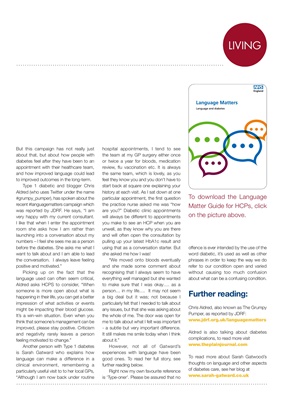
KITLIVING
But this campaign has not really just
about that, but about how people with
diabetes feel after they have been to an
appointment with their healthcare team,
and how improved language could lead
to improved outcomes in the long-term.
Type 1 diabetic and blogger Chris
Aldred (who uses Twitter under the name
#grumpy_pumper), has spoken about the
recent #languagematters campaign which
was reported by JDRF. He says, "I am
very happy with my current consultant.
I like that when I enter the appointment
room she asks how I am rather than
launching into a conversation about my
numbers - I feel she sees me as a person
before the diabetes. She asks me what I
want to talk about and I am able to lead
the conversation. I always leave feeling
positive and motivated."
Picking up on the fact that the
language used can often seem critical,
Aldred asks HCPS to consider, "When
someone is more open about what is
happening in their life, you can get a better
impression of what activities or events
might be impacting their blood glucose.
It's a win-win situation. Even when you
think that someone's management can be
improved, please stay positive. Criticism
and negativity rarely leaves a person
feeling motivated to change."
Another person with Type 1 diabetes
is Sarah Gatward who explains how
language can make a difference in a
clinical environment, remembering a
particularly useful visit to to her local GPs,
"Although I am now back under routine
hospital appointments, I tend to see
the team at my GP surgery either once
or twice a year for bloods, medication
review, flu vaccination etc. It is always
the same team, which is lovely, as you
feel they know you and you don't have to
start back at square one explaining your
history at each visit. As I sat down at one
particular appointment, the first question
the practice nurse asked me was "how
are you?" Diabetic clinic appointments
will always be different to appointments
you make to see an HCP when you are
unwell, as they know why you are there
and will often open the consultation by
pulling up your latest HbA1c result and
using that as a conversation starter. But
she asked me how I was!
"We moved onto bloods eventually
and she made some comment about
recognising that I always seem to have
everything well managed but she wanted
to make sure that I was okay…. as a
person… in my life…. It may not seem
a big deal but it was; not because I
particularly felt that I needed to talk about
any issues, but that she was asking about
the whole of me. The door was open for
me to talk about what I felt was important
- a subtle but very important difference.
It still makes me smile today when I think
about it."
However, not all of Gatward's
experiences with language have been
good ones. To read her full story, see
further reading below.
Right now my own favourite reference
is 'Type-oner'. Please be assured that no
offence is ever intended by the use of the
word diabetic, it's used as well as other
phrases in order to keep the way we do
refer to our condition open and varied
without causing too much confusion
about what can be a confusing condition.
Further reading:
Chris Aldred, also known as The Grumpy
Pumper, as reported by JDRF:
www.jdrf.org.uk/languagematters
Aldred is also talking about diabetes
complications, to read more visit
www.theplainjournal.com
To read more about Sarah Gatwood's
thoughts on language and other aspects
of diabetes care, see her blog at
www.sarah-gatward.co.uk
To download the Language
Matter Guide for HCPs, click
on the picture above.